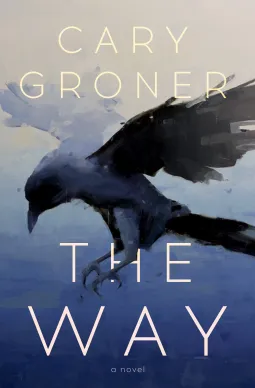The Way - Cary Groner

I received a copy of this book from the publisher via NetGalley.
I'm always a sucker for post-apocalyptic dystopian survival stories, and I like the structure of road novels where a character is on a journey with a fixed end point. The blurb promised a "highly original contribution" to the genre, so I was excited to give The Way a go. Here's that blurb:
A postapocalyptic road trip and a quest for redemption.
The world has been ravaged by a lethal virus and, with few exceptions, only the young have survived. Cities and infrastructures have been destroyed, and the natural world has reclaimed the landscape in surprising ways, with herds of wild camels roaming the American West and crocodiles that glow neon green lurking in the rivers.
Against this perilous backdrop, Will Collins, the de facto caretaker of a Buddhist monastery in Colorado, receives an urgent and mysterious request: to deliver a potential cure to a scientist in what was once California. So Will sets out, haunted by dreams of the woman he once loved, in a rusted-out pickup pulled by two mules. A menacing thug is on his tail. Armed militias patrol the roads. And the only way he’ll make it is with the help of a clever raven, an opinionated cat, and a tough teenage girl who has learned to survive on her own.
A highly original contribution to the canon of dystopian literature, The Way is a thrilling and imaginative novel, full of warmth, wisdom, and surprises that reflect our world in unsettling, uncanny, and even hopeful ways.
Initially I really enjoyed this. Although it's billed as SF&F the speculative elements (aside from "the majority of the global population have perished due to a mystery contagion") are initially fairly light, and at first it read much more like a western. Journeying across an American west populated by escaped zoo animals in an old Ford F-150 pulled by a pair of mules is very compelling to me, and the opening sequences had me hooked.
Unfortunately as time wore on I became less enamoured with things. Will spends his time talking to his cat Cassie and a raven named Peau that has adopted him, and initially it's hinted that his belief he can talk to them is linked to the illness that's killed everyone over the age of 30 (but not, for some reason, him). It's a little weird, but weird is fine. As things progress, though, his conversations with the bird and the cat become much less ambiguous, until he's holding explicit dialogues with them - something that other characters begin to take part in, too. It all became a little too farfetched for me, particularly as there's never any real attempt made to explain why humans can suddenly communicate with animals without any real issues. Things get even more ridiculous in a sequence in which the cat goes into heat and has sex with the raven, which is played off as being completely unremarkable. I almost put the book down at this point, but the rest of the story was compelling enough that I wanted to see where things went.
Ultimately I don't know if it was really worth persevering. There are some good set pieces and moments here, and it's competently written, but the ending feels like it suddenly rushes to tie everything up after having previously feeling like the book was happy to take its time getting to where it's going, and the ending it rushes towards isn't an especially good one. Particularly as so much of the book is concerned with Buddhist philosophy and talking about allowing things to take their natural course, I had hoped that a little more time would be allotted to allow things to resolve themselves.
My biggest problem, though, is one of simply not believing the central premise. A few characters mention that Will is uniquely suited to the task of urgently transporting a potential miracle cure across thousands of miles of hostile territory, but it's never made clear why this is true of a former science writer who has spent 15 years living in seclusion in a meditation centre. And during the course of his journey he isn't really tested in any way that demonstrates why he's the best choice. Everything comes fairly easily to him, and even in moments of peril he's often saved by acts of nature that verge on deus ex machina.
This isn't to say that there's nothing to like here. The post-catastrophe world is well realised and the few characters we meet feel real and complex. Some of the set pieces are really fun - particularly the train ride across the desert - and I just wish everything had a little more weight to it.
Overall this was an enjoyable, if inconsistent, read that may have benefitted from doing less with the speculative elements - specifically the conversational animals and weird interspecies sex scene - and leaning harder into the western side of things.